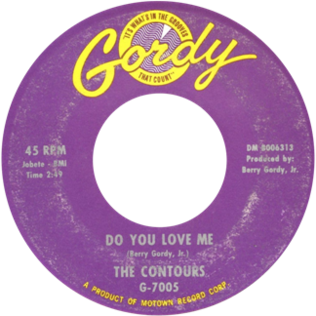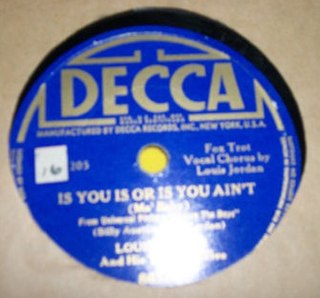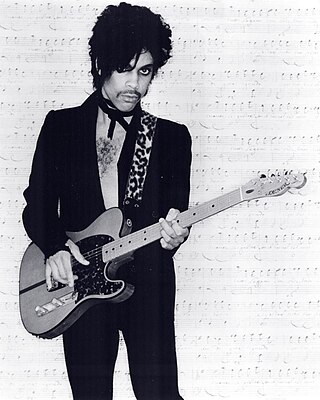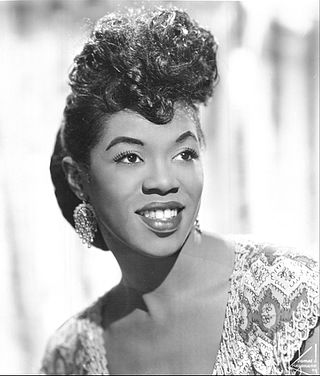Related Research Articles

"To Each His Own" is a popular song with music written by Jay Livingston and lyrics by Ray Evans. It is the title song of the movie of the same name and was published in 1946 by Paramount Music. The duo were assigned to write this song after film composer Victor Young turned it down.
"Zip-a-Dee-Doo-Dah" is a song composed by Allie Wrubel with lyrics by Ray Gilbert for the Disney 1946 live action and animated movie Song of the South, sung by James Baskett. For "Zip-a-Dee-Doo-Dah", the film won the Academy Award for Best Original Song and was the second Disney song to win this award, after "When You Wish upon a Star" from Pinocchio (1940). In 2004, it finished at number 47 in AFI's 100 Years...100 Songs, a survey of top tunes in American cinema.

"Do You Love Me" is a rhythm and blues song recorded by the Contours in 1962. Written and produced by Motown Records owner Berry Gordy Jr., it appeared twice on the Billboard Hot 100 chart, reaching numbers three in 1962 and eleven in 1988.
"It's All in the Game" is a pop song whose most successful version was recorded by Tommy Edwards in 1958. Carl Sigman composed the lyrics in 1951 to a wordless 1911 composition titled "Melody in A Major", written by Charles G. Dawes, who was later Vice President of the United States under Calvin Coolidge. It is the only No. 1 single in the U.S. to have been co-written by a U.S. Vice President or a Nobel Peace Prize laureate.

"Burn Rubber (Why You Wanna Hurt Me)" is a song originally performed by The Gap Band in 1980 and written by member Charlie Wilson, Rudy Taylor, and producer Lonnie Simmons.
"I'm Sorry" is a 1960 hit song by 15-year-old American singer Brenda Lee. The song was written by Dub Allbritten and Ronnie Self. It peaked at No. 1 on the Billboard Hot 100 singles chart in July 1960. On the UK Singles Chart, the song peaked at No.12. AllMusic guide wrote that it is the pop star's "definitive song", and one of the "finest teen pop songs of its era". In 1999, the 1960 recording by Lee on Decca Records was inducted into the Grammy Hall of Fame.

"Is You Is or Is You Ain't My Baby" is a song written by Louis Jordan and Billy Austin. The song's first recording, by Jordan, was made on October 4, 1943. It was released as the B-side of a single with "G.I. Jive" with the title "Is You Is or Is You Ain't ". The song reached No. 1 on the US folk/country charts, number two for three weeks on the pop chart, and number three on the R&B chart.

"Caldonia" is a jump blues song, first recorded in 1945 by Louis Jordan and his Tympany Five. Although credited to Fleecie Moore, his wife at the time, Jordan is the actual songwriter. The song was a hit for Jordan as well as several other musicians.
"Choo Choo Ch'Boogie" is a popular song written by Vaughn Horton, Denver Darling, and Milt Gabler.
"Trust in Me" is a song written by Ned Wever, Milton Ager, and Jean Schwartz. Popular versions in 1937 were by Mildred Bailey and by Wayne King & his Orchestra.

Jason Lee Epperson is an American record producer and DJ from St. Louis, Missouri. He first became known as the primary producer of hometown native Nelly's 2000 debut album Country Grammar, which received diamond certification by the Recording Industry Association of America (RIAA). Thereafter, he produced extensively for Nelly and his collaborators, and signed with his record label, Derrty Entertainment as in-house talent. He has since produced songs for other artists including Murphy Lee, St. Lunatics, Justin Timberlake, E-40, Cedric the Entertainer, Lil Wayne, Ron Isley, Three 6 Mafia, and Hilary Duff. Epperson's style is characterized by hip hop mixed with soul, R&B, and pop music. Billboard magazine, in its December 2000 issue, listed Epperson at number 16 on its "Top 100 Producers" list, as well as number 19 on its "Top 100 R&B/Hip Hop Producers of 2000" list. He has received a Grammy Award nomination.
"Doggin' Around" is a 1960 Rhythm and blues song written by Lena Agree and originally performed by Jackie Wilson. Reaching both the R&B and the pop singles charts in the U.S., "Doggin' Around" hit number one on the Hot R&B Sides chart for three weeks and peaked at number fifteen on the Billboard Hot 100. The A-side of the single was "Night", based on the aria "My Heart at Thy Sweet Voice" from the opera Samson and Delilah, by Saint-Saëns; it made the top five on the R&B and pop charts.
"G.I. Jive" is a 1944 song written and originally performed by Johnny Mercer.
"Stone Cold Dead in the Market (He Had It Coming)" is a 1939 song with lyrics and music by Wilmoth Houdini, a Trinidad and Tobago musician who had moved to the United States. Houdini's first version bore the title "He Had It Coming." It was recorded in 1946 by Ella Fitzgerald and Louis Jordan and His Tympany Five on Decca and later included in the Ella Fitzgerald album Ella and Her Fellas.
"Ain't That Just Like a Woman (They'll Do It Every Time)" is a 1946 song written by Claude Demetrius and Fleecie Moore and recorded by Louis Jordan and Tympany Five. The song reached number one on the R&B Jukebox chart for two weeks and peaked at number seventeen on the pop chart. Chuck Berry, who acknowledged the influence of both Louis Jordan and Carl Hogan, copied the latter's guitar intro to the song for his 1958 classic "Johnny B. Goode".

"Ain't Nobody Here but Us Chickens" is a jump blues song, written by Alex Kramer and Joan Whitney. Louis Jordan and his Tympany Five recorded the song on June 26, 1946, and Decca Records released it on a 78 rpm record. It was added to the Grammy Hall of Fame in 2013.
"Funny How Time Slips Away" is a song written by Willie Nelson and first recorded by country singer Billy Walker. Walker's version was issued as a single by Columbia Records in June 1961 and peaked at number 23 on the Hot C&W Sides chart. The song has been featured in several live action films and television shows, such as in the first episode of the second season of AMC’s Better Call Saul and in the 2020 Netflix drama The Devil All the Time.

Brenda, That's All is the seventh studio album by American singer Brenda Lee. The album was released October 15, 1962 on Decca Records and was produced by Owen Bradley. It was the second of two studio albums released in 1962 and included two Top 10 hit singles on the Billboard Hot 100 between 1962 and 1963.

Prince released several hundred songs both under his own name and under pseudonyms and/or pen names, as well as writing songs which have been recorded by other artists. Estimates of the actual number of songs written by Prince range anywhere from 500 to well over 1,000. He has released 117 singles, 41 promotional singles, 24 internet singles, and eight internet downloads.

The singles discography of American Jazz artist Sarah Vaughan contains 89 singles, two promotional singles and seven other charted songs. Vaughan recorded her first singles in 1946, with her first release being "If You Could See Me Now". Soon after, she saw her first major chart success on the Billboard pop list with "Tenderly" and "It's Magic." Moving to Columbia Records, she had further pop hits in the late 1940s with covers of "Black Coffee" and "Nature Boy." She had her second top ten hit in 1950 with "(I Love the Girl) I Love the Guy." Vaughan moved to Mercury Records during the 1950s and recorded more pop music. At Mercury, she had her biggest chart success, with the top ten hits "Make Yourself Comfortable" and "Whatever Lola Wants." In 1959, Vaughan's single "Broken Hearted Melody" reached number seven on the Billboard pop chart and became an international success, becoming the biggest single of her career.
References
- ↑ Dave Dexter, Jr. The Best of Louis Jordan (Liner Notes).
- 1 2 3 Whitburn, Joel (2004). Top R&B/Hip-Hop Singles: 1942–2004. Record Research. pp. 798, 309, 415.